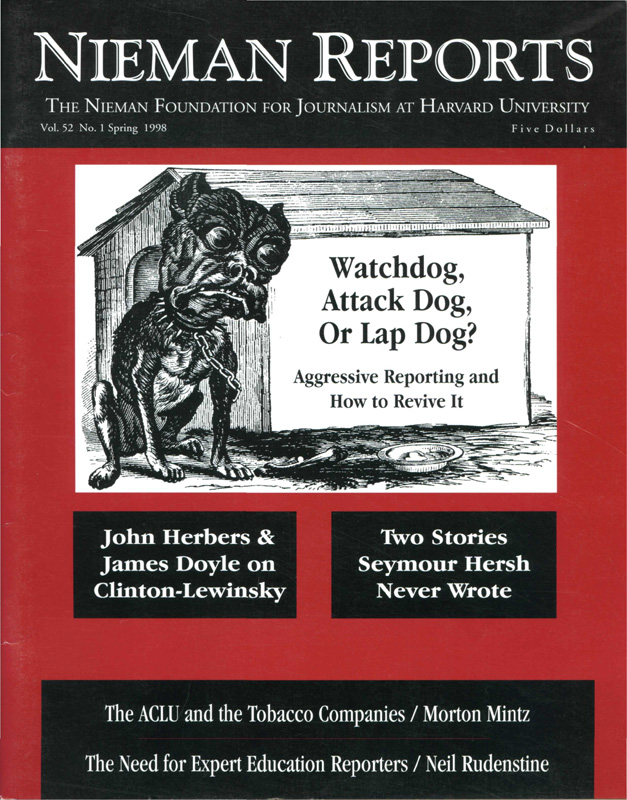It was a coin toss as to which provoked more contempt in my youth, authority or celebrity.
Fred Friendly combined them both, though his celebrity was of the professional, behind-the-scenes sort. He was the radio and television producer behind the very best work of Edward R. Murrow. Together, on "See It Now" and "CBS Reports," the Murrow-Friendly team invented the news documentary.
Friendly himself made headlines only once when, as president of CBS News in 1966, he quit after the network refused to preempt a rerun of "I Love Lucy" to carry Congressional hearings on the war in Vietnam. It was an act both of pique and of conscience. It would have been a footnote to a decade defined by acts of righteous indignation were it not for what Fred Friendly did with his life after that.
He taught, energizing his classroom with a passion that mocked that old canard, "Those who can, do; those who can’t, teach."
In the aftermath of the Watergate scandal, students with their sights set on MBA’s or juris doctor’s imagined themselves would-be Woodwards and Bernsteins instead and rerouted their career paths to the Graduate School of Journalism at Columbia University, where Friendly was the aptly named Edward R. Murrow Professor of Journalism.
Those interested in broadcast news scrambled to get the Great Man as their faculty adviser, a careerist display that triggered my aforementioned contempt. I asked the dean to assign me to anyone but Fred Friendly.
Had I known Friendly—irascible, egotistical, controlling—I could have predicted what happened next. After learning of my snub, he insisted I be assigned to him. "So," he boomed at our first meeting, his towering height as intimidating as his stentorian voice, "you’re the young woman who thinks I have nothing to teach her."
Veterans in the news business think of journalism schools as the Romper Rooms of their craft. If you want to be a reporter, their thinking goes, the way to learn is by doing the job, not by doing homework. There is much to be said for that view. But Fred Friendly’s mission was not to teach his charges the mechanics—such as placing attribution first or spelling foreign names phonetically when preparing a broadcast report. Mostly, he taught us how to think and how to push.
At CBS and at Columbia, he took the suggestion that an assignment was impossible as an affront. When Daniel Schorr insisted he could not get into East Berlin after the Wall went up in 1961, Friendly made him try until he did get in. When my master’s project required a trip out of state, he would hear nothing of logistical obstacles. He took me home to Riverdale, lent me the family car and pointed me toward the highway. I don’t know what scared me more: writing a thesis for him or driving his car on the Merritt Parkway in a thunderstorm.
There is a statue of Thomas Jefferson outside the window of the seminar room where Friendly and Columbia Law School professor (and later president of Yale) Benno Schmidt taught a course on journalism and the law. Jefferson would have appreciated what went on in that room. Pacing, challenging, demanding. Friendly trained journalists as if democracy itself depended on the results of his work.
To answer "I don’t know" to an ethical dilemma lie posed in that room would bring his fist down on the seminar table. "You need to know; you have to know," he’d shout.
"When you leave here, there will be no time on deadline to ask what’s right. You need to know it here," he’d say, gesturing to a spot somewhere between his heart and his gut.
We didn’t know it then, of course, but his message had as much to do with life as it did with journalism: we decide who we are and what we stand for, every day with every decision we make.
I am little more enamored of authority or celebrity today than I was 25 years ago, but having a celebrity-adviser did not turn out to be a crass career calculation, after all. My first job out of graduate school was as a secretary.
Fred Friendly, dead this week at age 82, did not give his students jobs. He gave us his conscience and pointed us toward the highway.
Eileen McNamarn, Nieman Fellow 1988, writing in her column in the March 7 issue of The Boston Globe.


